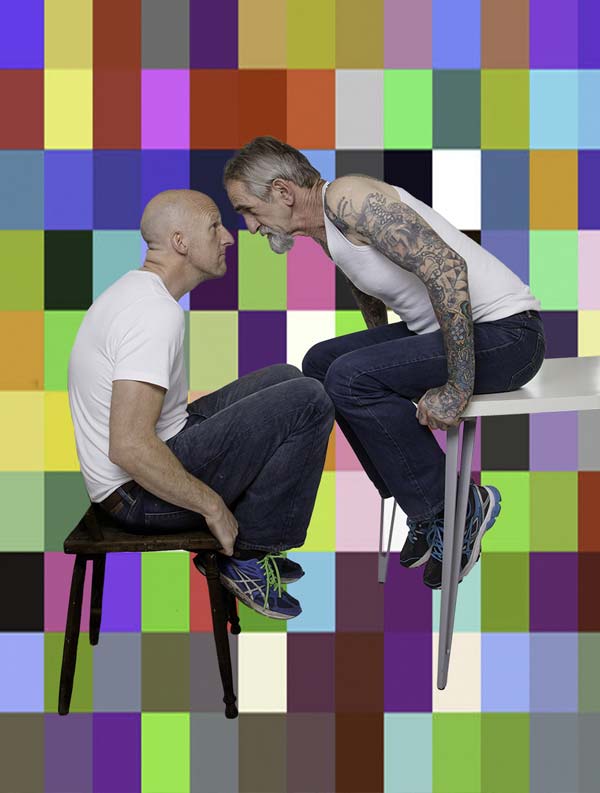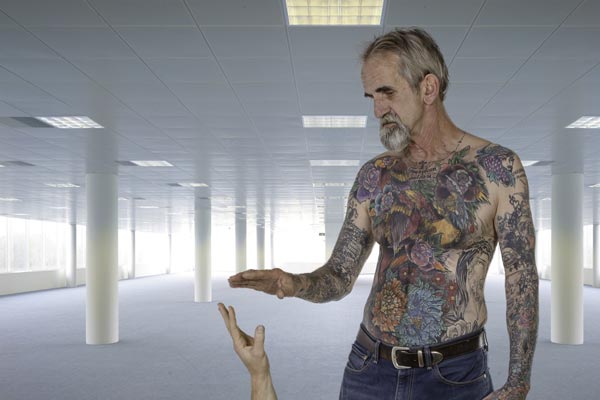Created by ex-parole officer and performance maker James Brennan with the help of David Woods, 'The Chat' takes a dark and humorous look at the criminal justice system.
The show centres around some key questions; how and when should people be forgiven for their crimes? Who gets to decide? What happens if they get it wrong? 'The Chat' brings ex- offenders and parole officers, criminologists and academics together with some of Australia's wildest performance makers to come to grips with these questions.
The structured one-on-one parole interview will be taken, subverted, transformed and reborn as an innovative performance score which compels audiences to consider the complex nature of what they are seeing – interrogation, anthropological study, confessional. How are the lives of those convicted of crime assessed, recorded and in what ways does this determine their systemic value? Co-creator of 'The Chat', James Brennan, is all too familiar with the inner-workings of the criminal justice system, and takes us behind bars:
Co-creator of 'The Chat', James Brennan, is all too familiar with the inner-workings of the criminal justice system, and takes us behind bars:
How does your position as a former parole officer help you navigate this project?
As a parole officer, interviews with offenders often left strong impressions on me. There is something absurd and wonderful about a parole interview. Two strangers sitting down – one is required to share so much sensitive material, the other is part-psychologist, part-policeman. Sometimes I turned myself into a fly on the wall, watching the interview. It was often better than most theatre I had seen.
I believe in the value of a one-on-one relationship between parole officer and an offender. The idea that something important and transformative can happen between them. It’s this belief that allows me to feel good about exploring the comical, dark and abstract aspects of this relationship.
You bring real life experience and knowledge to the production; how did you pass this knowledge on to the rest of the cast and crew?
This project treats ex-offenders as experts on criminal justice. They are the heart of the work. I was interested to discuss my ideas of with them as collaborators.
What would happen if you looked at parole process through an artistic lens? Of course it’s a very particular lens that is informed by my collaborators David Woods, Ashley Dyer and Alex Davies. Each of them brings a particular expertise. The work has drawn equally on each of them.
David Woods is my favourite actor working in Australia, bringing a wizardry to working with improvised text that I believe is the best in the country. Ashley Dyer has worked with me on this since 2013, he is an extraordinary workshop facilitator and has helped build a system of engaging offenders that merges our artistic goals with their skills development and participation. And brilliant Sydney-based visual artist Alex Davies has designed an interactive system that has shaped the physical world that we inhabit. So the experience and contribution of each of these artists and ex-offenders has guided the work as much as my own.
What made you to want to explore the criminal justice system? And why a theatre production?
I think criminal justice is a great litmus test to measure how we treat each other. It's where the great dilemmas exist. How should we treat people who hurt us whilst maintaining our own dignity?
The best and the worst exist in these hypothetical vacuums. The theatre is the place to bring those questions to life. Also, apart form being a parole officer, making theatre is the only thing I’m qualified to do.
When did you begin working on the project?
In August 2013, in a small village 60km from the Ukrainian border, where I was working as a member of avant-garde Polish theatre company called Gardzienice. It’s been great.
Do you think prison is a touchy subject in society? Why is that?
Australia’s modern history is obviously horrendous. Boat loads of offenders being shipped here to an ancient and inhabited land to set up a prison colony. Obviously there is a lot of trauma and mess wrapped up in that story. Our relationship with prison and punishment is bound up with those memories.
The trauma of indigenous genocide – and I know from my own family history – the legacies associated with these stories lived on and were handed down to me from our second fleet ancestor. The healthy but somehow messed up distrust of authority, the survival instinct of the wily criminal. We can feel proud of this convict history, as I do – and I think this can also lead us to overlook how full-on our colonial history was. These people laid the first stones of our countries prisons. And those stones are still forming the foundations.
How will 'The Chat' approach the rhetoric surrounding this issue?
We are looking through an artistic lens. The language around crime and punishment is obviously very loaded. And that makes for great comedy.
What is your personal view of the criminal justice system? How do you think it could be changed?
One of Australia’s great minds on criminal justice is Professor Eileen Baldry. I draw on her wisdom here. She has a great sense of the big picture of criminal justice in Australia, as well as a great understanding of its impacts on individuals and their communities. She points out that criminal justice in the west –and Australia is certainly included in this – in the last few decades has been heaped with the task of dealing with some of the social and health problems that face us, such as drugs and mental health. The result has been a steep rise in the number of people going to prison. The figures are staggering.
As a result, the role of prison has become misunderstood. Prison should be the last resort, rather than the default response. There is overwhelming evidence that putting people in prison is the most likely contributing factor of them returning to prison.
Thinkers like Foucault have traced our treatment of criminals back to dark times where the public performance of punishment was standard. Certainly we have come a long way since then, but we still have a fair way to go before many of us are able to see our criminal justice system as something that reflects the principles we strive for. The way I see it, we have become sentimental in the most grotesque way about the right to capture and imprison people, to remove their liberties. I don't believe in this and I hope to razz people a bit to hopefully think critically about some of these issues.
Working with offenders in NSW I witnessed the need for a diverse range of services that responds to these issues. These services attempt to catch the individuals that fall through the gaps and are not able to manage. I am keen on a scenario that supports and reinforces these services in order to help us deal with the dynamic and ever changing social problems we will continue to face.
What are your views on second chances and forgiveness for serious crimes?
They are different things. Both of these ideas can be part of the process of dealing with serious crimes, but it takes much more than this.
Second chances on their own, they are never enough. They are probably not useful unless accompanied by some sort of careful or contextual response.
Forgiveness is what we strive for, it is personal. And yet criminal justice systems should include forgiveness in their discourse, as they need to include the perspective of victims, and their important role in breaking the cycles of crime.
What is your view on Chris Brown's recent denial of a visa for his previous domestic violence crime; do you think the decision is fair?
Without knowing the details, Chris Brown seems to have walloped Rhi Rhi, correct? While I absolutely support the need to bring awareness to all aspects of violence against women, ultimately I think the balance of judgement needs to be contextual. However, given the bad publicity this gave to all people who commit violence against women and children and anyone... I’m just going to imagine that every due diligence was taken in assessing this case and they found that Chris Brown was indeed... a prick.
'The Chat' plays La Boite's Indie season 4-14 November.

